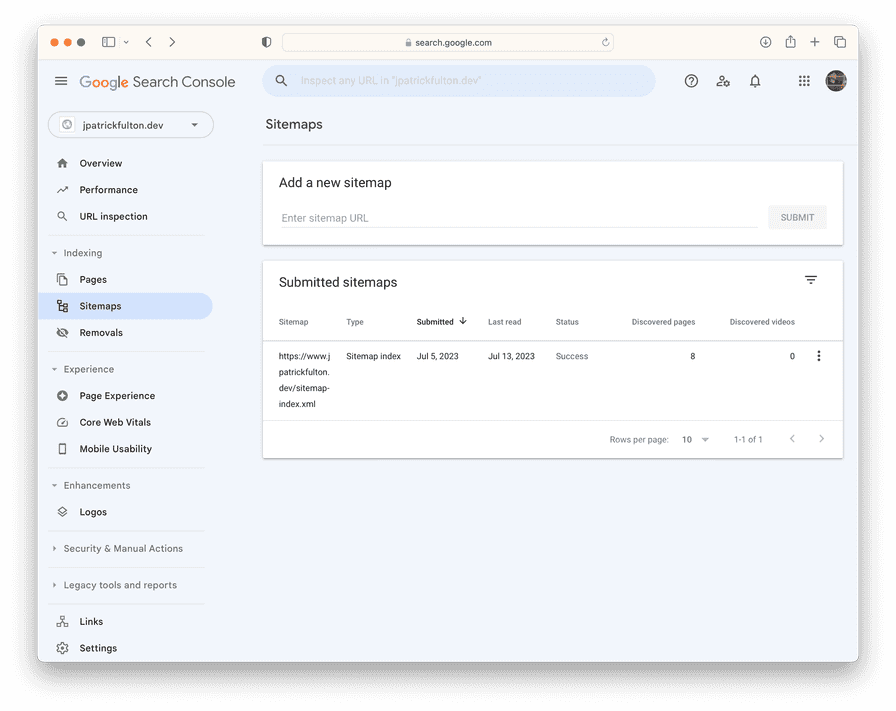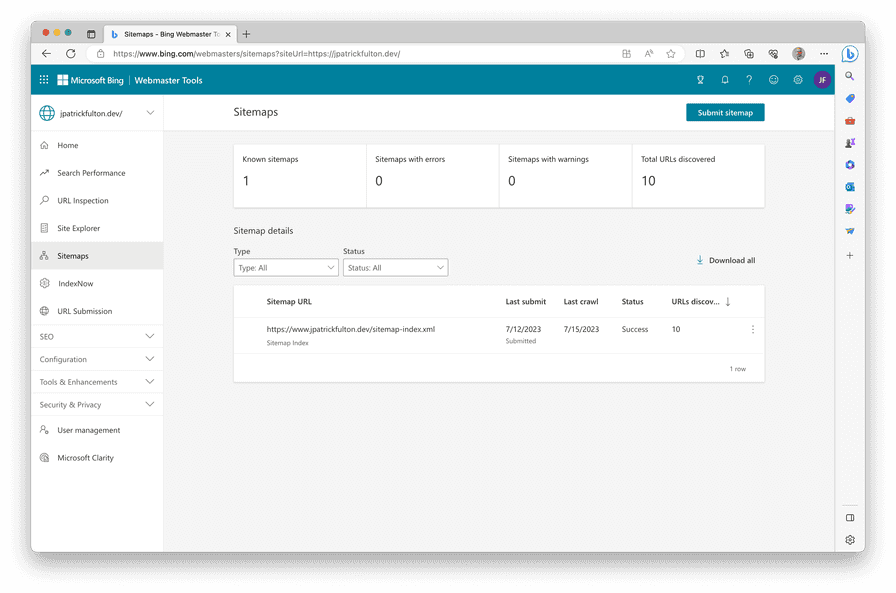Building Better Sitemaps for a Gatsby Site
July 17, 2023 - 5 min read (888 words)
Gatsby offers a sitemap plugin to generate sitemap XML documents for the sites it generates. However, in its default configuration, it needs customization to be useful to most search engines. Luckily, it is possible to change the default configuration and supplement its logic with both other plugins and custom logic. In this post, I cover how to leverage Git commits to update the sitemap and introduce last modification dates to each URL entry.
The evolving GitHub repository storing this blog and its implementation can be found here.
Table of Contents
The Default Sitemap Plugin Output
Using the default configuration of the gatsby-plugin-sitemap plugin, the following
output can be expected. The changefreq and priority tags will contain the same
value for all URLs and no lastmod tag is generated.
Per the Google documentation:
Google ignores
<priority>and<changefreq>values.Google uses the
<lastmod>value if it’s consistently and verifiably accurate
<?xml version="1.0" encoding="UTF-8"?>
<urlset xmlns="http://www.sitemaps.org/schemas/sitemap/0.9">
<url>
<loc>https://example.net/blog/</loc>
<changefreq>daily</changefreq> <priority>0.7</priority> </url>
<url>
<loc>https://example.net/</loc>
<changefreq>daily</changefreq> <priority>0.7</priority> </url>
</urlset>The Desired Sitemap Output
In a desired state, the changefreq and priority tags would be omitted
and a lastmod tag would contain a timestamp that accurately reflected
the last change in content that was made to that page.
<urlset xmlns="http://www.sitemaps.org/schemas/sitemap/0.9" xmlns:news="http://www.google.com/schemas/sitemap-news/0.9" xmlns:xhtml="http://www.w3.org/1999/xhtml" xmlns:image="http://www.google.com/schemas/sitemap-image/1.1" xmlns:video="http://www.google.com/schemas/sitemap-video/1.1">
...
<url>
<loc>https://www.jpatrickfulton.dev/blog/2023-06-23-samba-and-timemachine/</loc> <lastmod>2023-07-10T02:48:04.000Z</lastmod>
</url>
<url>
<loc>https://www.jpatrickfulton.dev/</loc> <lastmod>2023-07-17T01:25:59.000Z</lastmod>
</url>
</urlset>The Plugins
To accomplish our goals of removing the unneeded tags and introducing a
last modification timestamp that is based on the Git commit that last changed
the content of a page we need two plugins: the official gatsby-plugin-sitemap
plugin and a plugin from the community gatsby-plugin-git-lastmod.
Configuring the Plugins
The gatsby-plugin-git-lastmod may be used without additional configuration values.
It is MDX compatible and will introduce a new node to the pageContext object
to carry the last timestamp of the Git modification to the source file generating
a page or blog post using its gatsby-node.js
file.
In the listing below, the query options parameter is configured to return
the pageContext object and a custom serialize function is provided that
both omits the unneeded tags and introduces the desired lastmod tag. This
configuration will generate correct entries for all blog postings.
plugins: [
{
resolve: `gatsby-plugin-sitemap`,
options: {
query: `
{
site {
siteMetadata {
siteUrl
}
}
allSitePage {
nodes {
path
pageContext
}
}
}
`,
serialize: ({ path, pageContext }) => {
return {
url: path,
lastmod: pageContext?.lastMod,
};
},
},
},
`gatsby-plugin-git-lastmod`,
...
]Handling Last Modification Date for the Index Page
The outlier case is that of the index page. Using only the configuration
from above, the lastmod timestamp of the index page would only
update when code changes were made to alter its structure. However, the
index page actually changes upon alteration to any of the blog
pages that it links.
To address this case, we need to introduce some custom code to our
own gatsby-node.js file with logic similar to the logic contained
in the gatsby-plugin-git-lastmod plugin. Note that in earlier
commits, this implementation converted the gatsby-node.js file to use
ES module syntax
for better compatibility with the
MDX plugin
in Gatsby v5+.
The code below keep track of the latest timestamp on which a blog entry was modified then uses that value to set an override to the index page’s last modification timestamp.
const simpleGit = require(`simple-git`);
let latestBlogModification = new Date(1900, 1, 1);
export const onCreatePage = async ({ page, actions }) => {
if (page.component.includes("blog-post.js")) {
// looking for mdx blog posts
const filePath = page.component.split("?__contentFilePath=").pop();
const fileLog = await simpleGit().log({
file: filePath,
maxCount: 1,
strictDate: true,
});
// update latestBlogModification date
const gitLogDate = new Date(fileLog?.latest?.date);
if (latestBlogModification < gitLogDate) {
latestBlogModification = gitLogDate;
}
return;
}
// blogs are processed first, elements under src/pages/ second
// allows the accurate setting of the lastBlogModification module
// variable
if (page.path === "/") {
// looking only for the root index page
const { createPage } = actions;
return createPage({
...page,
context: {
...page.context,
// set the lastMod key to override the value that would
// have been set in the gatsby-plugin-git-lastmod plugin
// for use in sitemap generation
lastMod: latestBlogModification.toISOString(),
},
});
}
};The complete version of this file for this site implementation can be found here.
Updating Robots.txt
In a final step, to ease the crawling of the site by search engines,
the robots.txt file may be modified to include a fully qualified URL
to the sitemap output. This file will be hosted on the root of the site
and is placed in the /static/ folder in the source tree.
User-agent: *
Disallow: /8846484b349642449a66629f496422f8.txt
Disallow: /rss.xml
Sitemap: https://www.jpatrickfulton.dev/sitemap-index.xmlSubmitting Sitemaps
While search engine crawlers will look for sitemaps on the root of your site, directly submitting your sitemap to each search engine can accelerate the process of crawling.
Submitting a Sitemap to Google
Using the Google Search Console, navigate on the right-hand navigation menu to Sitemaps and add a new sitemap.

Submitting a Sitemap to Bing
Using the Bing Webmaster Tools, navigate to Sitemaps > Submit sitemap to add a sitemap URL.


Written by J. Patrick Fulton.